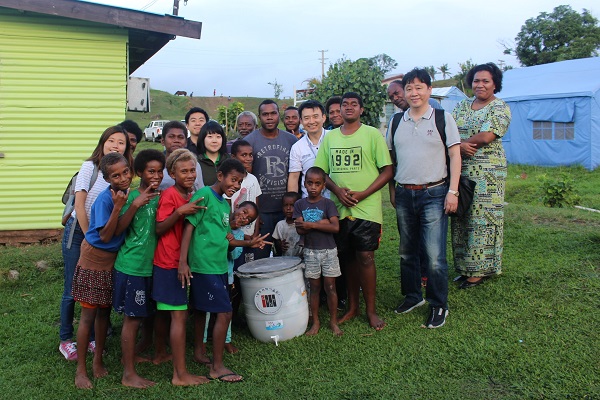Media Center
A multimedia mosaic of moments at GIST
GIST Excellence
[Press release] GIST technology is being used for humanitarian relief on the South Pacific island of Fiji
- 엘리스 리
- REG_DATE : 2016.07.11
- HIT : 1163
GIST technology is being used for humanitarian
relief on the South Pacific island of Fiji

Picture: The filtering equipment developed by the International Institute for Environmental Studies at GIST (center) and Professor Kyoung-Woong Kim (second from right) with residents of Qelekuro, Fiji.
The World Health Organization (WHO) has asked GIST to produce a water filtering system for the South Pacific island of Fiji that was recently devastated by a cyclone, leaving people in affected areas with no access to clean drinking water. In response, the International Institute for Environmental Studies at GIST (Director Jun-Ha Kim) and Knowledge Sharing International have donated three water filtering systems on July 4, 2016.
.
The water filtration system was developed by a team led by Professor Kyoung-Woong Kim and Professor Yunho Lee of the School of Earth Sciences and Environmental Engineering. The system uses gravity to filter water through a special semipermeable membrane that is able to remove 99% of harmful contaminants, including pathogenic bacteria such as E. coli, without the need of electricity.

Water filtration diagram. Professor Kyoung-Woong Kim and Professor Yunho Lee
Qelekuro area was hit in February by the cyclone Winston, which had wind speed of 300km/h and destroyed every building in the village. Residents were forced to live in tents, and they had no local access to clean drinking water, which resulted in residents suffering from multiple occurrences of waterborne diseases such as typhoid and cholera. WHO experts have designated Qelekuro as a “region of interest (hotspot),” and they are participating in the emergency relief activities.
The International Institute for Environmental Studies at GIST plans to expand supply of its water filtering system to the South Pacific region in the near future with assistance from the Korean governments and non-governmental aid agencies.
Professor Kyoung-Woong Kim said, “Thanks to the water filtration system we donated, more people on Fiji can now drink clean water. I want humanity to enjoy a safer and happier life through our technology.”